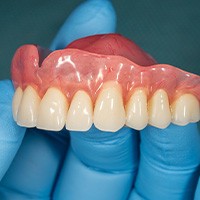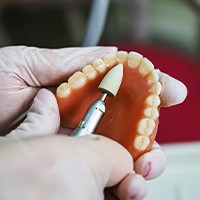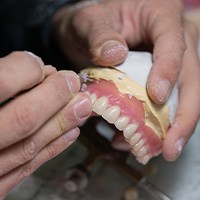Dentures – Owings Mills, MD
Reconstruct Your Smile After Tooth Loss
 At Dolfield Dental, Dr. Jacob Milner understands how inconvenient and difficult it can be to just go about daily life when you’re missing most or all of your teeth. Thankfully, traditional dentures have come a long way since the uncomfortable and unnatural-looking ones your grandparents may have worn. Modern dentures in Owings Mills are much more durable and lifelike than ever before. If you’re ready to reconstruct your smile after tooth loss, contact us today to schedule your dentures consultation.
At Dolfield Dental, Dr. Jacob Milner understands how inconvenient and difficult it can be to just go about daily life when you’re missing most or all of your teeth. Thankfully, traditional dentures have come a long way since the uncomfortable and unnatural-looking ones your grandparents may have worn. Modern dentures in Owings Mills are much more durable and lifelike than ever before. If you’re ready to reconstruct your smile after tooth loss, contact us today to schedule your dentures consultation.
Who’s a Good Candidate for Dentures?

No matter how many teeth you’re missing, nearly anyone can get dentures. First, you’ll need to schedule a consultation with Dr. Milner or Dr. Miller to determine if you’re eligible. If you’re not yet a good candidate, it may still be possible to become one by restoring the health of your gums and bone structure. Your dentist will discuss these factors and their treatment, if applicable, at your visit.
Effects of Missing Teeth

There are many reasons why adults could be missing permanent teeth, including tooth decay, gum disease, and injury. While Dr. Milner and Dr. Miller will always do everything they can to save your tooth, sometimes the damage can be too severe and extracting it is the best solution.
Unfortunately, leaving empty spaces in your mouth isn’t ideal, even if it’s in the very back of your arch. Missing teeth can cause a variety of negative consequences, including facial sagging due to lack of jaw support, difficulty speaking due to improper tongue placement, trouble eating, and even diminished self-esteem.
What Qualifies You for Dentures?

If you’ve experienced significant tooth loss, have sensitive teeth, or a lot of decay, as long as you have sufficient healthy gum tissue and jawbone strength, you are likely a good candidate for dentures. You must also be committed to caring for your mouth and your dentures, as this is still important even if you wear prosthetics and have no remaining natural teeth.
The number of teeth you’re missing will determine which type of dentures Dr. Milner and Dr. Miller will recommend for you, as there are different options to choose from, such as full, partial, implant, and immediate dentures. They are much more affordable than other methods of tooth replacement, which often makes them ideal for patients on a tight budget.
Alternative Tooth-Replacement Options

If you aren’t a good candidate for dentures, there are still other options you may want to consider. These include dental bridges and dental implants.
- Dental Bridges: These prosthetics are an excellent solution for patients who are only missing one or just a few teeth. However, they do require healthy teeth surrounding the missing tooth or teeth to support the bridge.
- Dental Implants: Dental implants are attached via a titanium post inserted in the jawbone, so you must have a solid bone structure to receive this treatment. They are more costly than traditional dentures, however because they are permanently attached to your jaw, they are considered permanent and should not require replacement.
Types of Dentures

Depending on the state of your oral health and your specific smile needs, Dr. Milner may recommend one of the following types of dentures:
Partial Dentures
Even missing just a few teeth here and there can make it embarrassing to smile in front of others. Fortunately, a partial denture can rebuild your smile in such a way that onlookers shouldn’t be able to differentiate it from your natural teeth.
Consisting of a gum-colored acrylic base and a metal framework, a partial denture fills the gaps in your grin with prosthetic teeth that are custom-made to mimic the size, shape, and color of the rest of your smile. Clips or clasps hold the partial in place behind your remaining teeth.
Full Dentures
Also made of a pink acrylic base, a full denture replaces an entire row of lost teeth and sits comfortably on your gums. Natural suction helps it stay in place, but if you need added security, purchasing some denture adhesive could help.
Implant-Retained Dentures
If you want a denture that will last longer and be more secure as well as permanent instead of removable, we can anchor a denture onto dental implants. Just four to six implant posts can be placed throughout the jaw to provide enough support for a full or partial denture. Rather than removing them to clean them, implant-retained dentures can be maintained just like natural teeth with daily brushing and flossing.
How Dentures Are Made

Modern dentures aren’t like the dentures that your grandparents used to wear. They are custom-made for each patient for comfort, sturdiness, and a natural-looking appearance. To achieve this, dentures require a multi-step process. Continue reading to learn more about what makes up dentures and the process of their creation.
What Are Dentures Made Of?

Dentures are comprised of two parts: the base and the replacement teeth. Here is a closer look at each one:
- Base: The base is the foundational structure of the replacement teeth. It can be made from various materials, but acrylic tends to be the most popular since it can be tailored to look very similar to natural gum tissue.
- Teeth: In most cases, the replacement teeth attached to the base of the denture are made from resin or porcelain. Both of these materials look similar to real tooth enamel. They even reflect light in a similar way.
The Denture Creation Process

All dentures are customized, so each treatment looks a little bit different. Here are the steps one can typically expect:
- Measurements are taken of the jaw, and impressions are taken of your upper and lower gums. These are used to create a plaster model of your mouth.
- The model is sent to the dental lab where your dentures are made. First, your replacement teeth are set in place using an “articulator.” Adjustments are then made by the lab technician.
- The wax dentures are sent to your dentist for a fitting. If everything looks and feels good, they are returned to the dental lab to complete the process.
- Once your dentures are back at the lab, the wax needs to be replaced with acrylic. To do this, the lab technician places the dentures into a flask. Plaster is then poured into it to maintain the shape of the dentures. The whole flask is placed in hot water to melt away the wax.
- The plaster is cut from the dentures with dental tools. Then, the dentures placed into an ultrasonic bath to wash away the remaining plaster.
- Excess acrylic is cut from the dentures. Then, they are polished.
- The dentures are sent back to the dental office.
- If you and your dentist are happy with the final product, you can leave showing off your complete smile.
Adjusting to Your New Dentures

When you get your prosthetic, you might experience some minor soreness and discomfort, but this is perfectly normal as your mouth adjusts to your new prosthesis. Your dentures will start to feel more natural over time. When you first get your dentures, it’s ideal to stick to a softer diet and exercise your facial muscles. With time, you can introduce harder foods. If discomfort persists or you have any concerns, don’t hesitate to give us a call.
Benefits of Dentures

Here are just a few of the reasons to choose dentures for tooth replacement:
- Renewed ability to bite, chew, speak, and smile with ease
- Boosted confidence
- Custom-made solution that looks natural
- Improved oral health
- Improved overall health from being able to chew healthy crunchy foods like vegetables
- A long-lasting solution to full or partial tooth loss
Understanding the Cost of Dentures

As with any kind of dental work, the cost can vary based on a number of factors. When it comes to the dentures, we must consider the following:
- The exact type of dentures needed
- The number of teeth you are missing
- The materials used to create your denture
- Any pre-denture work you may need, such as tooth extractions or gum disease therapy
To make paying for your treatment easier, our practice is in-network with several major dental insurance carriers, including Aetna, BlueCross BlueShield, and Delta Dental. We also accept monthly payment plans from reputable third-party companies like CareCredit. Lastly, we have an in-office Membership Plan. For a low annual fee, you can receive FREE preventive care as well as a 15% discount on most other treatments, including dentures.
Denture FAQs
How Long Will You Have to Wait to Get Dentures After Your Teeth are Pulled?
The average wait time between when your teeth are extracted and when you get your new dentures is about six to eight weeks. However, the exact time will depend on the type of denture you’re getting.
Your wait time gives your gums time to heal as well as to ensure that your dentures fit properly. If you are receiving implant dentures, you’ll need to wait a bit longer, between four to six months, to allow the implant time to join with your jawbone via osseointegration.
Can I Reline My Dentures Myself?
In recent years there has been a social media trend of people attempting DIY denture relining. The idea behind this movement is that you can adjust your restorations yourself to save money and ensure a better fit. In fact, some stores and online retailers have begun selling DIY reline kits.
While it may seem like a good idea, the truth is that relining your dentures yourself is harder than it seems. Only a trained dentist will have a qualified opinion as to how to repair improperly fitting dentures, and if you’re not careful, DIY relining could lead to an even worse fit than before!
Another issue is that you won’t have a good view if you perform a denture reline yourself. To truly understand what you’re doing, you’ll need to see what you’re doing, which is impossible without an outside perspective.
Finally, DIY relining can often cause pain and make it harder to chew, especially if you don’t have the correct tools to complete the repair. This can eventually cause more costly repairs or require you to replace the denture completely.
Can I Sleep with My Dentures?
When you first get your new dentures, your dentist will typically instruct you to keep them in your mouth for 24 hours, even during your sleep. However, after the first full day, you should be removing them every night before you go to bed and leaving them submerged in a glass of water or denture soak until it’s time to wear them again.
Wearing dentures restricts the circulation in your gums, which can lead to soft-tissue irritation and can even speed up ridge resorption. By removing your dentures each night, you give your gums a chance to recover and get the nutrients they need as you sleep.
It is also important to note that the dark, moist space underneath your dentures is an ideal place for bacteria to thrive. Because of this, sleeping with dentures can increase your risk of pneumonia.
Additionally, poor oral hygiene and higher levels of gum and tongue plaque can occur if you wear your dentures for too long.
Can I Use Regular Toothpaste to Clean My Dentures?
Your dentures should be brushed, flossed, and rinsed after each meal, but you should never use toothpaste on them. Toothpaste is abrasive and can leave microscopic scratches on the surface of your prosthetics, which over time can leave them seriously damaged.
For this same reason, you should never use a hard-bristled brush to on them; always choose a soft-bristled toothbrush instead.
Dentures can be cleaned with hand soap, mild dishwashing liquid, or denture cleanser.
